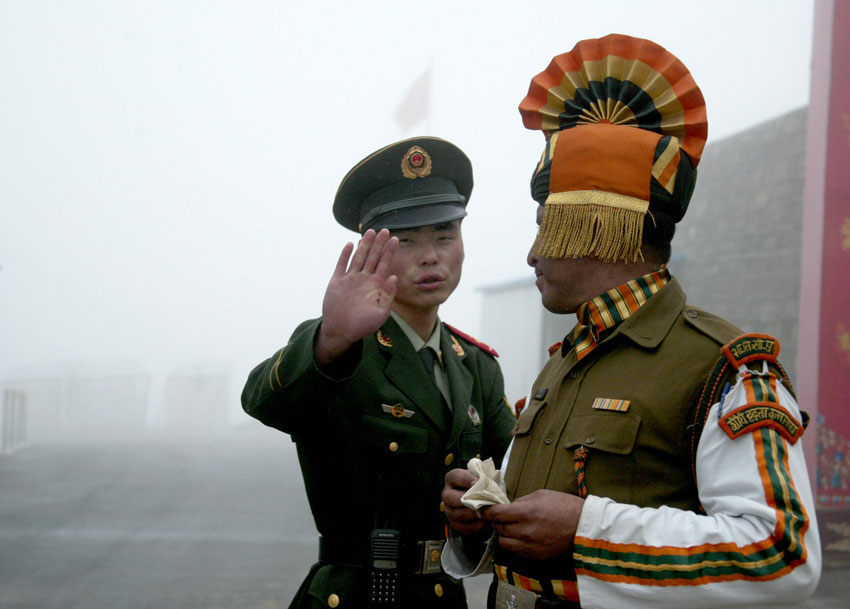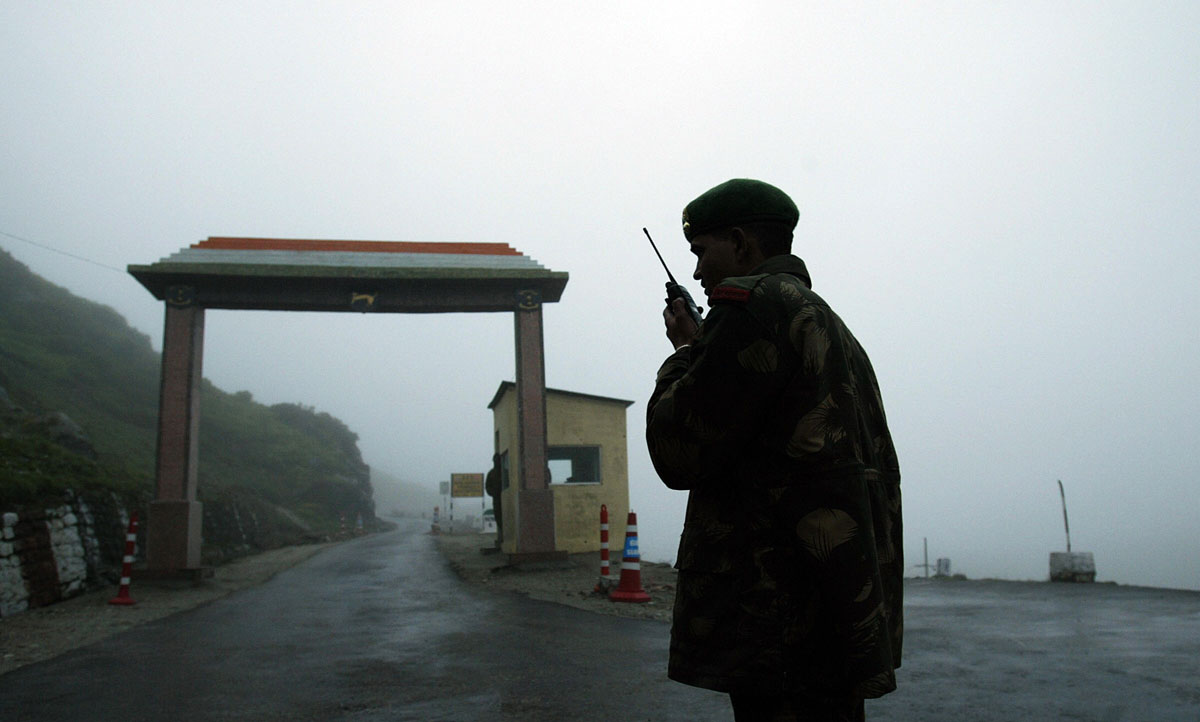China’s PLA Says It Will Beef Up Patrols in Doklam but Mum on Road
File photo, taken on July 4, 2006, of an Indian soldier as he communicates with colleagues on a walkie-talkie at Nathula Gate, leading to the Nathu La border crossing between India and China, some 31 miles east of Sikkim state capital Gangtok. (Deshakalyan Chowdhury/AFP/Getty Images)
Chinese Foreign Minister Wang Yi said, Aug. 30, the 73-day stand-off between India and China in Doklam ended after India withdrew its troops and asked New Delhi to “learn lessons” and prevent such incidents in future. China’s military said, Aug. 31, it will beef up the presence of troops and patrols to protect “every inch” of its territory in Doklam but was evasive on the construction of the road which was stopped by Indian troops, leading to a 73-day standoff, writes K.J.M. Varma.
India and China ended their standoff in Doklam, Aug. 28, by withdrawing their troops from the area, just days before Prime Minister Narendra Modi’s visit to China to attend the BRICS (Brazil, Russia, India, China and South Africa) summit.
“The Chinese military will continue to carry out its missions and responsibilities, beef up patrols and troops stationed there and resolutely safeguard national sovereignty and security,” Ren Guoqiang, a spokesperson for the Chinese defense ministry, said in his first interaction with the media after the end of the standoff.
He, however, was evasive about People’s Liberation Army’s move to build the road close to the strategic Chicken Neck area in Doklam which prompted the Indian troops to intervene and stop its construction.
Bhutan, which claims sovereignty over the area, protested to China for building the road on Bhutanese territory.

“In the light of the changes in the landscape we have made adjustment in our deployment,” he said, without elaborating.
“The Chinese side will continue to patrol the Dong Long (Doklam) area for a long period of time to better guard our border and improve the living and working conditions of the military and civilians living in the area,” Ren said.
“We have long built infrastructure construction and including building of roads. In future, we will continue to make plan for infrastructure construction taking into consideration various factors including weather conditions,” he said, without elaborating about plans to build the road.
China has tried to highlight the Indian troops withdrawal while remaining silent about the fate of the road which was the primary objection for India.
Ren also rubbished speculative reports in social media claiming that China promised India huge loans for the withdrawal of the troops.
“On your question about China providing loans to India to withdraw troops, we have checked with the relevant authorities of the government and such reports are pure fabrication,” he said.
Claiming that “Doklam is China’s inherent territory” disregarding Bhutan’s claims, Ren said, “every inch of the beautiful mountains and rivers of the motherland cannot be lost. Chinese armed forces will carry out the sacred mission safeguarding territorial integrity and national sovereignty and protect every inch of the land in Doklam.”
He also put up a lengthy defense about how Chinese military handled the standoff – regarded as the worst between the two countries since the 1962 war.
On the incident at the Pangong lake in Ladakh, where troops on both sides scuffled and pelted stones at each other, he said, “the Indian side should enforce strict discipline on the border defense troops and abide by the agreements and consensus reached by the two sides so as to maintain peace and tranquility along the border.”
China said earlier that it lodged a protest to India on the incident.
The “military-to-military relationship between India and China is an important component for the overall bilateral relationship between the two countries,” he said.
“The defense establishments and armed forces should strengthen strategic communication to avoid misjudgment and misunderstanding. But such kind of healthy development requires efforts from both sides,” he added.
India Should Draw Lessons from Doklam Standoff: China
Chinese Foreign Minister Wang Yi said, Aug. 30, the 73-day stand-off between India and China in Doklam ended after India withdrew its troops and asked New Delhi to “learn lessons” and prevent such incidents in future.
“The border face off caused by Indian trespassing has been settled,” Wang told the media in Beijing, while answering a question from the Chinese media reports that India withdrew troops to provide a face saver for China after reaching a settlement.
Media may have carried speculation and reports but as per the “authoritative information” with the Chinese government, Indian troops have withdrawn from the area on the afternoon of August 28, which “brought the faceoff to an end,” he said.
“That is a basic fact and of course, we hope that the Indian side will learn lessons from this incident and prevent similar things from happening again,” he said, answering a question on media reports stating that India withdrew troops to provide a face saver for China after reaching a settlement.
In New Delhi, the External Affairs Ministry did not immediately comment on the Chinese foreign minister’s remarks.
Troops of the two countries had been locked in a standoff in Doklam since June 16 after Indian troops stopped the Chinese Army from building a road in the strategically key Doklam region, a disputed area between China and Bhutan.
The Indian Army had blocked the construction of the road as it could give China a major military advantage over India at the Bhutan-China-India tri-junction.
About the differences between the two countries, Wang who addressed a press conference here about the BRICS summit to be held in Xiamen city next week said, “India and China are two big countries. It is natural that there are some problems in our interactions.”
“What is important is that we put these differences at appropriate place and under the principle of mutual respect and following the consensus of our leaders, we need to handle and manage them properly,” he said.
“In the meantime, with our engagement through different mechanisms we need to work out a solution in the long run,” he said.
He also evaded a direct reply to whether there will be meeting between Modi and President Xi Jinping.
There will be bilateral meetings and interactions between the participating leaders which is natural practice, he said.
India announced, Aug. 29, that Modi will take part in the Xiamen summit.
“On the sidelines of the BRICS meeting, Xi will also have meetings with some leaders upon their request. Once relevant arrangements are decided we will let you know. The first thing is whether the leaders will have the willingness to meet. If there is willingness of the leaders participating in the meeting, as a host Chinese side will try to make it possible if our schedule program permits,” he said.
About the discord between India and China, which are important members of the BRICS, he said “we hope through the efforts of both sides we will maintain healthy and stable momentum of growth for China India relations” in the interest of Chinese and Indian people as well as meeting the aspiration of international community and neighboring countries.
Wang said there is huge potential and space for greater cooperation between China and India and such cooperation serves the interest of the two countries.
“We hope China and India will join hands and work together for rejuvenation of Asia and for the development of our region and contribute our share to greater development,” he said.
The BRICS summit will be held in the southeast Chinese city of Xiamen from September 3 to 5.


